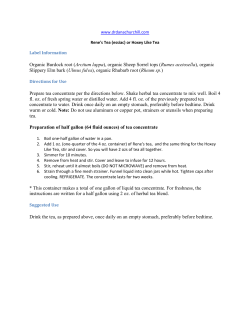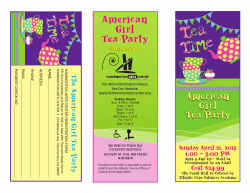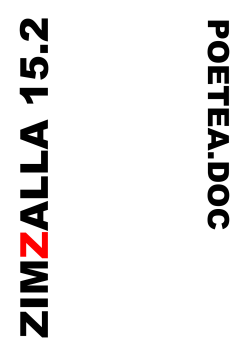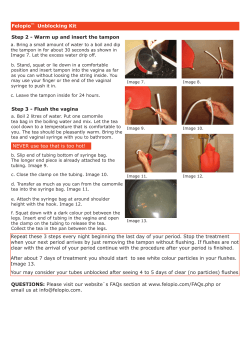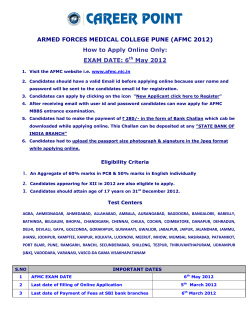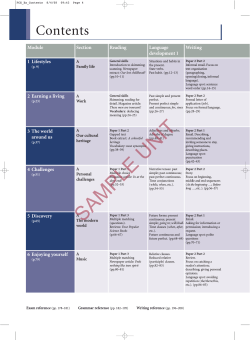
PA P E R 3 U...
PA P E R 3 U S E O F E N G L I S H General Description Answering Paper Format For all parts of this paper candidates write their answers on an answer sheet. The paper contains five parts. Timing Number of Questions 1 hour 15 minutes. 65. Marks Task Types Questions 1–30 and 41–65 carry one mark. Questions 31–40 carry two marks. Multiple-choice cloze, open cloze, key word transformations, error correction, word formation. Part 1 Task Type and Focus Number of Questions Task Format Multiple-choice cloze 15 A modified cloze text containing 15 gaps and followed by 15 four-option multiple-choice questions. 15 A modified cloze text containing 15 gaps. 10 Discrete items with a lead-in sentence and a gapped response to complete using a given word. 15 A text containing errors. Some lines of the text are correct, other lines contain an extra, incorrect word which must be identified. 10 A text containing 10 gaps. Each gap corresponds to a word. The ‘stems’ of the missing words are given beside the text and must be transformed to provide the missing word. An emphasis on vocabulary 2 Open cloze Grammar and vocabulary 3 Key word transformations Grammar and vocabulary 4 Error correction An emphasis on grammar 5 Word formation Vocabulary Page 28 P R E PA R I N G F O R PA P E R 3 The Use of English paper is divided into five parts, each part being defined in terms of its task type and language focus. take no notice of’, ‘to look forward to -ing’, etc., can be tested in this format. Any of the words that make up the phrase may be the key word. Developing an awareness of parallel and synonymous expressions should be part of candidates’ preparation for this part. Part 1 In Part 1 candidates must choose one word or phrase from a set of four (A, B, C, D) to fill a gap in a text. This may involve choosing ‘leaking’, rather than ‘pouring’, ‘spilling’ or ‘flowing’, to fill the gap in: ‘The roof of our tent was .... .’ Or it may mean choosing ‘interested’, rather than ‘keen’, ‘eager’ or ‘enthusiastic’, to fill the gap in: ‘You may be .... in applying for this job.’ In the first case, candidates have to know the meaning of the word, but in the second they must know not just the meaning, but also the preposition and verb form that follow. In the second example, ‘keen’ is wrong, not because it has the wrong meaning, but because it does not fit in with the grammar of the sentence. This part of the paper also tests fixed phrases and collocations, such as ‘to pay attention to’ and ‘to take no notice of’, as well as phrasal verbs, and linkers such as ‘in case’, ‘as long as’, ‘even if’ and ‘while’. In preparing for Paper 3, candidates should be encouraged to learn whole phrases rather than just individual words. Vocabulary practice that brings out the differences in meaning between similar words (e.g. ‘jump’ and ‘leap’) will also help candidates to prepare for this part of the paper, but knowing the grammatical patterns and collocations is as important as knowing the meaning. Part 4 In Part 4 candidates must decide if the fifteen lines of a text contain a wrong word or not. Most lines contain errors and they are the sort of errors that FCE level learners typically make in their writing, such as incorrect auxiliary verbs, prepositions, pronouns and articles. The text resembles something that a student at this level might write. The absence or misuse of capital letters and other punctuation is ignored; correct spelling is required. In preparation for this part, candidates can be encouraged to identify and correct their own or their classmates’ written work, which may help to improve their accuracy when writing. Part 5 Part 5 is a word-building task, based on a text with ten gaps. The types of word-building involve not just the addition of affixes (e.g. ‘honest’ to ‘dishonesty’), but also internal changes (‘strong’ to ‘strength’) and compounding (e.g. ‘rain’ to ‘raindrop’). The absence or misuse of capital letters and other punctuation is ignored; correct spelling is required. To prepare for this part of the paper, it is best to adopt a systematic and methodical approach to these different types of word formation. As is the case for all texts on Paper 3, Part 1 has a title. Candidates can make use of the title by thinking about what it suggests to them, and in this way they can attempt to predict what they are going to read, which will help them to understand the text. Part 2 Part 2 is a modified cloze text containing fifteen gaps, testing structural and lexical accuracy. A single word is needed to fill each gap. There may be more than one acceptable word for a gap, defined by the mark scheme. The absence or misuse of capital letters and other punctuation is ignored; correct spelling is required. Learning words and expressions in context will help candidates in this part of the paper. Part 3 Part 3 contains ten key word transformations: each question consists of a prompt sentence followed by a response sentence of which the beginning and end are given. The gap must be filled with between two and five words, one of which must be the key word which is given. This word must not be changed. In Part 3, a wide range of structures such as reported speech, passive voice, conditionals, verb tenses as well as modal verbs are tested. In addition, phrasal verbs and lexical phrases such as ‘to have difficulty in -ing’, ‘to Page 29 origin. 0102/3 W96 quality. The best are delicate (15) ..... of numerous teas from different sources and countries of The types of tea that are popular in Britain are (14) ..... inexpensive but they are of a very high each sample from a spoon and deciding what is a (13) ..... price for each tea. majority in Britain drink their tea. The tasters move down the line with surprising (12) ..... , tasting (10) ..... in a line on long tables. Teas are generally tasted with milk, (11) ..... that is how the sold at each week’s tea sale. It is fascinating to see them at (9) ..... . Over a hundred samples are London Tea Trade Centre, where they are tasted by (8) ..... professional tea tasters before being Samples of the vast amounts of tea brought into the country to (7) ..... the national thirst go to the (5) ..... to London. Britain is (6) ..... the largest importer of tea in the world. cups a day or some 1500 cups annually. Some thirty per cent of the world’s exports of tea makes its national drink: every man, woman and child over ten years of age has (4) ..... average over four industry of (1) ..... importance in the (2) ..... lives of the British. Tea is without (3) ..... the British 15 A 14 A 13 A 12 A 11 A 10 A mixtures roughly fine speed out of composed action effective 8 A The London Tea Trade Centre is on the north (0) ..... of the River Thames. It is the centre of an 9 A satisfy 7 A THE LONDON TEA TRADE D coast considerably C D 6 A B shore route A C 5 A 0 border for A B 4 A 0 bank doubt 3 A Example: common 2 A For questions 1-15, read the text below and decide which answer (A, B, C or D) best fits each space. There is an example at the beginning (0). Mark your answers on the separate answer sheet. B B B B B B B B B B B B B B B associations C C C C C C C C C C C C C C 0102/3 W96 comparatively right hurry since put up operation skilled match by far way by dispute typical wide C high Part 1 1 A 3 2 unions slightly fair rush so settled practice developed answer largely direction at disbelief everyday great D D D D D D D D D D D D D D D [Turn over gatherings approximately deserved dash owing to laid out work handy serve by much journey on uncertainty usual large PA P E R 3 U S E O F E N G L I S H S A M P L E PA P E R Page 30 Page 31 anything. 0102/3 W96 restaurants, toilets and many (29) .......... facilities, so (30) .......... was no need to go elsewhere for comfort, luxury and excitement previously unknown to customers. Almost from the start they had millions of people. They offered not only an enormous range of goods, (28) .......... also levels of (27) .......... is certain is that department stores completely changed the shopping experience for the way that it is used there (26) .......... it clear that it was already widely understood. The expression wasn’t used in print (25) .......... 1893, when it appeared in Harper’s magazine, but in the United States. We don’t (24) .......... when people started calling them department stores. Others followed Stewart’s example and soon there were stores (23) .......... his in many major cities Palace. It was, (22) .......... for many years would remain, the largest shop in the world. he moved to an eight-storey building nearby, (21) .......... he renamed A.T. Stewart’s Cast-Iron had (19) .......... staff of two thousand. For Stewart even that was not enough, (20) .......... . In 1862 goods (17) .......... a single roof. The business did very (18) .......... . It expanded rapidly and soon department store. Before this, no-one (16) .......... tried to bring together such a wide range of doing so, he gave the world something completely new - the Marble Dry-Goods Palace. By (0) .......... In 1846 an Irish immigrant in New York named Alexander Stewart opened a business called the DEPARTMENT STORES doing 0 is not old enough to The gap can be filled by the words ‘is not old enough to’ so you write: My brother ...................................................... drive a car. not My brother is too young to drive a car. 0102/3 W96 Robert has .................................……………… for two years. out 34 Robert has not had a job for two years. Suzanne was .................................……………… not sleep. that 33 Suzanne was too excited to sleep. Mrs Noble asked Eric .................................……………… her gloves anywhere. seen 32 ‘Have you seen my gloves anywhere, Eric?’ asked Mrs Noble. Why .................................……………… up a new hobby? want 31 Why are you interested in taking up a new hobby? 0 Example: [Turn over For questions 31-40, complete the second sentence so that it has a similar meaning to the first sentence, using the word given. Do not change the word given. You must use between two and five words, including the word given. There is an example at the beginning (0). Write only the missing words on the separate answer sheet. For questions 16-30, read the text below and think of the word which best fits each space. Use only one word in each space. There is an example at the beginning (0). Write your answers on the separate answer sheet. 0 Part 3 Part 2 Example: 5 4 Page 32 difficult in the beginning because I tend to find it very hard to 43 quite enjoying myself so far yet. The main thing I’ve learnt to do is how to give up detailed information to customers over the phone. Unfortunately, I also have to make the coffee and do other boring things! Sometimes there’s no-one except from me in the office and it gets really busy. I intend to working until the end of the month and then I’m going off on a short holiday by the sea, where I just hope I’ll manage to relax myself on the beach before going back to college in next month. 48 49 50 51 52 53 54 55 turned Lynda .................................……………… of £5,000 from the newspaper for her story. 0102/3 W96 0102/3 W96 work very hard and, although the pay isn’t much good, I’m 40 The newspaper offered Lynda £5,000 for her story, but she refused. at first. So I make sure of I’m always on time now. I have to and because I was often late I got into terrible trouble 47 45 46 The author’s latest novel .................................……………… stay in Majorca. was 39 The author wrote her latest novel while she was staying in Majorca. get up in the morning. My boss is very keen on some punctuality, she has been very kindly given me a holiday job. It was 42 I .................................……………… the council building a new road here. 44 One of my father’s friends who has a small travel agency, and 41 38 I don’t object to the council building a new road here. objection A HOLIDAY JOB parents must be really proud of you. I’ve got some great news. ✓ over 00 00 0 Congratulations on getting over your teaching diploma. Your Examples: [Turn over For questions 41-55, read the text below and look carefully at each line. Some of the lines are correct, and some have a word which should not be there. If a line is correct, put a tick (✓) by the number on the separate answer sheet. If a line has a word which should not be there, write the word on the separate answer sheet. There are two examples at the beginning (0 and 00). Part 4 7 0 The clients .................................……………… in a first-class hotel. staying 37 The clients demanded to stay in a first-class hotel. The thief ran right past you so .................................……………… his face. must 36 The thief ran right past you so I’m sure you saw his face. ‘I will .................................……………… you pay me £500 extra,’ said Frank. not 35 ‘I will complete the work only if you pay me £500 extra,’ said Frank. 6 8 Part 5 For questions 56-65, read the text below. Use the word given in capitals at the end of each line to form a word that fits in the space in the same line. There is an example at the beginning (0). Write your answers on the separate answer sheet. Example: 0 ability COMPUTERS THAT PLAY GAMES ability to play chess for many years now, and Computers have had the (0) ........... ABLE their (56) ..... in games against the best players in the world has shown PERFORM steady (57) ..... . However, it will be years before the designers of computer IMPROVE games machines can beat their (58) ..... challenge yet - the ancient BIG board game called Go. The playing area is (59) ..... larger than in chess CONSIDERABLE and there are far more pieces, so that the (60) ..... of moves is almost COMBINE (61) ..... . The game involves planning so many moves ahead END that even the (62) ..... calculations of the fastest modern computers IMPRESS are (63) ..... to deal with the problems of the game. SUFFICIENT In a recent (64) ..... for computer Go machines, the best machine beat all COMPETE its computer rivals, but lost (65) ..... to three young schoolchildren, so there HEAVY is obviously still a lot of work to do! 0102/3 W96 Page 33 PA P E R 3 U S E O F E N G L I S H A N S W E R K E Y Part 1 Part 2 1 2 3 4 5 6 7 8 9 10 11 12 13 14 15 16 17 18 19 20 21 22 23 24 25 26 27 28 29 30 C C A D B B A B D D B A C B A had under/beneath/underneath well a however/though which NOT that and like know until/till/before makes W/what but other/extra/additional there Part 3 Part 4 31 32 33 34 35 36 37 38 39 40 41 42 43 44 45 46 47 48 49 50 51 52 53 54 55 do you want l to take if/whether l he/she had seen so excited (that) l she could been l out of work/a job not complete the work l unless you must l have seen insisted on/upon l staying have no/haven’t any/make no l objection to was written l during her/a turned down l the/an offer Part 5 56 57 58 59 60 61 62 63 64 65 performance improvement biggest considerably combination endless impressive insufficent competition heavily who been ✓ some ✓ of ✓ yet up ✓ from to ✓ myself in Questions 1–30 and 41–65 are given one mark each, and questions 31–40 are given two marks each. The total score is adjusted to give a mark out of 40. Page 34 PA P E R 3 U S E O F E N G L I S H A N S W E R S H E E T Page 35
© Copyright 2025
